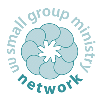Some program leaders have included in their congregation's small group ministry model the request that there be no response or interchange of experience during the topic portion of the meeting. Others allow verbal exchanges after all have shared. And yet a third group allows verbal exchange during the entire topic portion, as long as everyone listens respectfully. It is my understanding that these approaches all work.
Allowing verbal exchange allows group synergy to occur and allows participants to inspire insights in each other, as group members explore common experiences and revelations, etc. Group bonding can also occur from this sharing. On the other hand, it may feel like people are not listening, as they piggy back on your experience with theirs. It may also be limiting to the individual's expression and may inhibit deep sharing.
In my own congregation's program, we allow interchange during the entire topic portion of the meeting, though often everyone shares individually first, without any response from other group members. The groups I have participated in and led often experienced commonality of experience and enhanced bonding during this period of interchange.
Does your group's model include interchange during the topic part of the meeting? Please share with the other 1450 of us. Diana_dorroh@hotmail.com.







